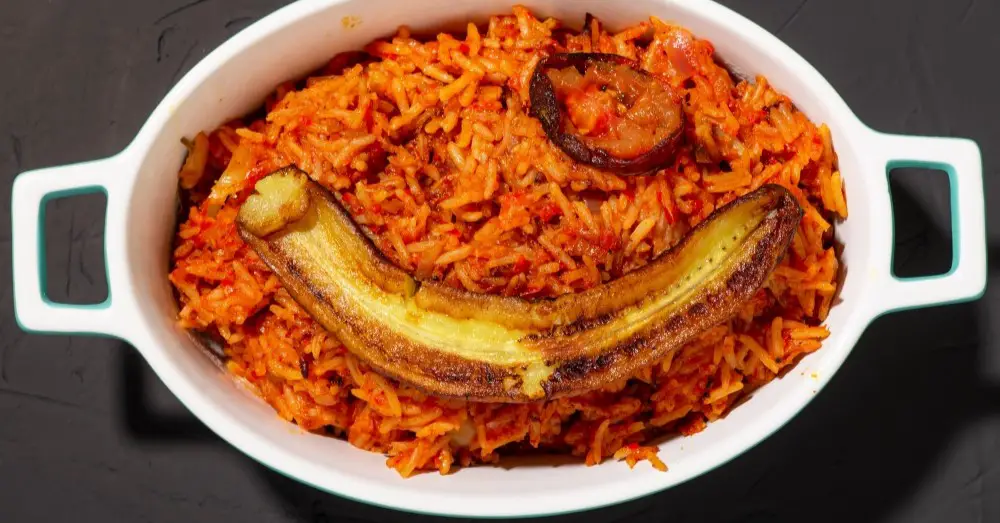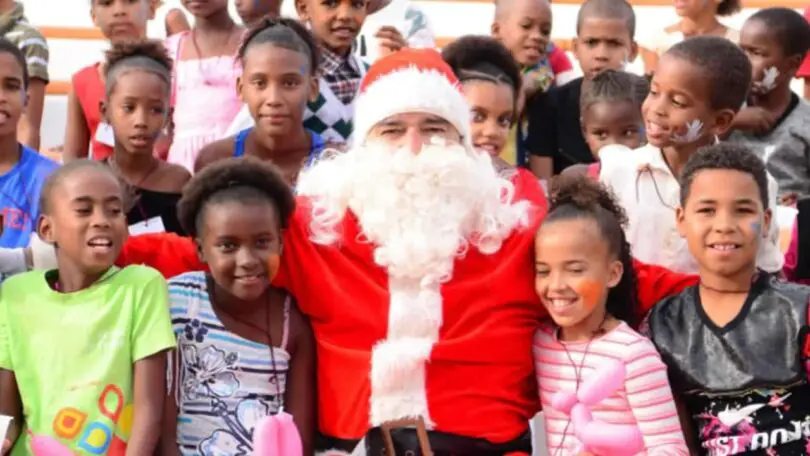African Christmas holiday is a massive celebration in Africa, home to nearly half of the continent’s population. While snow and fir trees are not part of this holiday tradition, festive concerts, outdoor feasts and parades most certainly are. Whether gathering with friends or attending mass, there is something special about Christmas throughout Africa. Each country has its unique spin on celebrating this wonderful time of year.
Table of Contents
What do Africans Eat on Christmas?
During the African Christmas holiday, people typically enjoy a variety of traditional African dishes. These include the following:
- Stews such as chakalaka (a spicy tomato and bean stew), samp (maize porridge) and mogodu (tripe stew)
- African-style barbecued beef, chicken, or goat
- Side dishes may include African-style rice, maize meal, sweet potatoes and plantains
- African Christmas desserts typically consist of puddings or cakes made with fruit such as dates, raisins, apples or oranges.
- African-style beverages such as rooibos tea are also served.
What Does African Christmas Holiday Offer?
Christmas holiday in Africa is a time of celebration and joy for many worldwide. But how do Africans in the majority Christian countries celebrate Christmas? This season is filled with music, food, and beloved traditions that make it unique – from singing carols to exchanging gifts to holding elaborate church services. Below are some unique traditions African Christians have adopted throughout the centuries to spread cheer and love during the holiday season.

A Christmas holiday in Africa. Photo/Sputnik Africa
1. Church Services and Christmas Caroling
Across Africa, honouring the birth of Jesus through church services is a cherished Christmas tradition. On Christmas Eve and Christmas Day, attendees can engage in nativity scenes, dancing performances, communion tables, and carolling – all to commemorate the holiday season! Every moment spent rejoicing together will be filled with festive cheer as they celebrate this particular time of year. Locals celebrate Christmas with unique traditions from the Congo to Malawi and Zambia. In the Congo, people bring a gift for their church’s Communion table and hold musical events complete with five choirs!
As for Malawi, children spread cheer door-to-door by carolling in exchange for small cash donations. Lastly, you can hear beautiful melodies throughout Zambian streets as churches host nativity plays. In many African countries, the celebrations African Christmas holiday begin after Midnight Mass. For example, in The Gambia and Sierra Leone, there is a joyous parade following the mass service with people carrying fanals – lanterns made from bamboo and paper shaped like houses or boats lit up by candles. Residents go around to collect donations while taking part in colourful masquerade parties. So when Santa arrives at these places, he will have an extra special welcome!
2. African Christmas Feasts
Around the globe, Christmas is marked to celebrate the birth of Jesus and indulge in a delicious meal. Africa is no exception! Kenyans savor grilled meats at nyama choma, while South Africans relish their renowned outdoor braais during this festive time. These meat-centric meals are accompanied by potato stew, making for an exquisite holiday feast across the continent. From Tanzania to Senegal, African families feast on traditional dishes such as fufu (mashed cassava), peanut stew, and ogbono soup. Jollof rice is a popular dish in Nigeria at Christmas feasts.
If you’re looking to celebrate Christmas in Tanzania, indulge in the local delicacy of roasted cow or goat followed by some home-brewed beer. In Liberia, meanwhile, feast on an array of beef and rice with biscuits for a special occasion. Nigeria serves up its festive flavoursome dishes like flavoured rice cooked with tomato stew and fried chicken/goat as main courses. Or why not head off to Ghana where locals offer their classic Jollof Rice served alongside fufu and okra soup – genuinely delicious. Regardless of your destination or what you eat, the Christmas meal in Africa is about unity. Invite everyone – family, friends, acquaintances; every individual is welcome.

Nigerian Jollof rice. Photo/ 12 Tomatoes.
3. Not Every African Believes in Santa Claus
Christmas in Africa is not necessarily a continent-wide Santa experience. Some countries do not believe in the idea of an old, red-suited man with his sleigh delivering presents to children. For example, Liberia has unique holiday customs and traditions, such as Old Man Bayka or ‘devil’ walking around on Christmas Day asking for gifts instead of giving them out!
Furthermore, Liberians don’t wish each other “Merry Christmas” but rather “My Christmas on you”, which translates to “please give me something nice for the holidays”. Additionally, there are certain countries, such as Ethiopia and Egypt, where the presence of Santa Claus is not believed in. In contrast, in other African countries such as Mauritius and Madagascar, African Santa Clause arrives on the back of a zebu (a species of cattle) – sure to bring lots of smiles and joy to children. On the other hand, in Tanzania, African Santa rides atop a Masai giraffe!
4. Christmas Calendar isn’t on the Same Day Everywhere in Africa
December 25th is the day that most countries celebrate Christmas. However, some African countries have different traditions. In Ethiopia, for example, the African Christmas holiday known as Ganna is held on January 7th. African Christians in Egypt go by Coptic Christmas on January 6th while African Catholics and Protestants of the rest of Africa traditionally honour Christmas on December 25th.
5. African Christmas Decorations
African countries have their unique ways of decorating for the Holiday season! In Nigeria and South Africa, people often hang colourful African prints on their walls and windows, while in Ethiopia, you will find traditional wooden crosses and African crafts. Christmas trees are decorated with carvings, sculptures, and colourful African fabrics as ornaments. These unique decorations help to bring the African culture alive during the African Christmas holiday season!
6. African Gifts
African gifts are a great way to spread holiday cheer! In Liberia and Ghana, children receive African books, toys, and clothes as gifts. African jewellery is also popular in countries like Nigeria and Tanzania, where you can find traditional African beaded necklaces and earrings for family members and friends.
7. African Music
African Christmas music is an essential part of African culture during the holiday season. African Gospel singers and contemporary artists often perform traditional African Christmas carols to spread joy and cheer throughout the continent. African drums are also used to celebrate, drawing in listeners from all over to experience African Christmas music.








